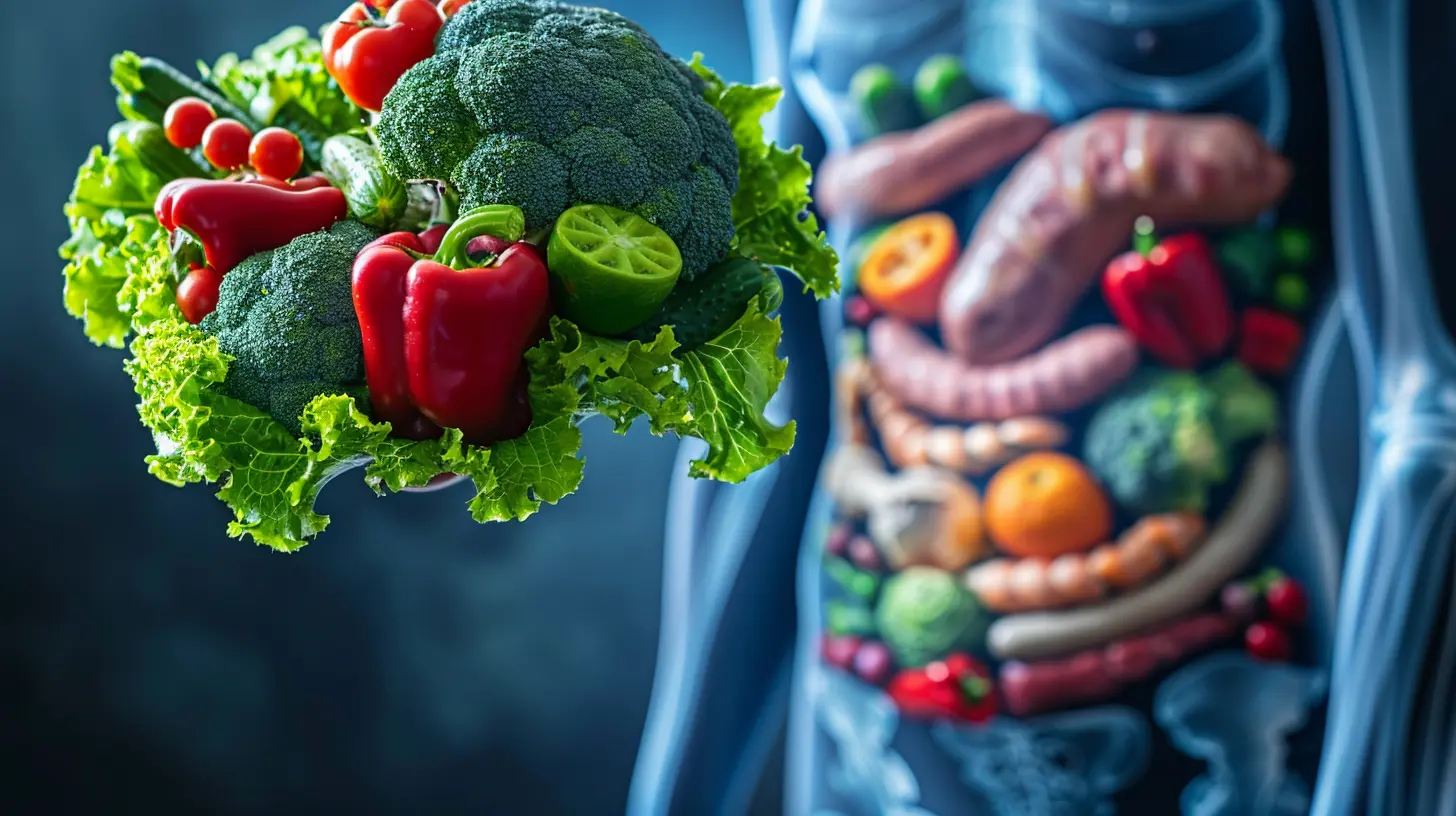Hormones and Digestive Health: The Forgotten Connection
15 October 2025
Ever felt those butterflies in your stomach right before a big meeting or a first date? That sudden, squirmy feeling isn't just nerves—it’s your hormones throwing a party in your gut. Yeah, hormones and your digestive health are tightly linked, like dance partners moving in sync. Most of us think hormones only control things like mood swings, menstruation, or that teen acne we couldn't escape. But hold on. There's a secret world inside us where hormones are also the unsung heroes (or villains) of how well your stomach and intestines work.
Welcome to the forgotten connection between hormones and digestive health—a relationship so powerful, it can shape the way you digest food, absorb nutrients, and even how you feel after a meal. Let’s pull back the curtain, gut-first.
The Gut: Your Second Brain
Yep, you’ve got another brain, and it’s not in your head. It’s in your gut, and it’s officially called the Enteric Nervous System (ENS). This “brain” is a complex network of neurons lining your gastrointestinal tract. What’s wild is, it can operate independently of the brain in your skull.And guess what connects these two brains?
Hormones.
They act like tiny messengers, delivering instructions from your brain to your gut and vice versa. Ever heard of the gut-brain axis? That’s the communication highway where hormones are the traffic controllers, signaling when to digest, when to rest, and even when to run to the bathroom.
Meet the Hormonal All-Stars of Digestion
Let’s run through the VIP list of hormones that directly influence digestive health. Some of them, you’ve probably heard of. Some are the undercover agents behind the scenes.1. Cortisol — The Stress Commander
Ah yes, cortisol. The “stress hormone.” It’s supposed to help you deal with short-term stress, like missing your bus or arguing with your WiFi router. But chronic stress? That’s where trouble brews. Elevated cortisol levels can slow down digestion, reduce stomach acid, and even cause leaky gut syndrome.Ever get stomach cramps when you're under pressure? That’s cortisol squeezing your gut into a knot.
2. Ghrelin — The Hunger Gremlin
This little guy makes you ravenous. Ghrelin is produced in the stomach and signals your brain that it’s feeding time. But when ghrelin is out of balance, you might feel hungry all the time, even when your body doesn’t need fuel. That leads to overeating, bloating, and—you guessed it—digestive chaos.3. Leptin — The Stop-Sign You Ignore
Leptin plays tug-of-war with ghrelin. It tells your brain, “Hey, we’re full, stop eating.” But with long-term poor diet, leptin resistance can happen. Your body keeps shouting “I’m full!” but your brain puts on noise-canceling headphones. The result? Overeating, sluggish digestion, and weight gain.4. Insulin — The Blood Sugar Boss
Insulin doesn't just manage blood sugar. It has its fingers in multiple digestive pies. Poor insulin sensitivity can lead to fat storage and inflammation in the gut. And get this—it can slow down gastric emptying, making you feel overly full or nauseated after meals.5. Estrogen & Progesterone — The Hormonal Duo
These reproductive hormones don’t just manage menstrual cycles. Estrogen helps keep gut lining strong and inflammation in check. Progesterone, on the other hand, slows down digestion. That’s why women often experience constipation or bloating during certain times of their cycle.6. Serotonin — The Feel-Good Gut Whisperer
Did you know 90% of serotonin is produced in your gut, not your brain? This mood-regulating hormone also regulates intestinal movements. A lack of serotonin can contribute to constipation, while too much can trigger diarrhea. So yes, your mood literally moves through your stomach.
Hormonal Imbalance: A Recipe for Gut Mayhem
When hormones tip out of balance, the gut suffers. You might start noticing issues like:- Bloating after every meal
- Constipation or diarrhea
- Acid reflux
- Loss of appetite or emotional eating
- Chronic fatigue or mood swings
- Skin issues (hello, acne and eczema!)
Sound familiar? It’s not all in your head. It’s in your gut too. Hormonal imbalances sneak in like a thief in the night and start messing with how your digestive system works.
Hormones, Microbiome, and the Delicate Dance
Now, let’s throw one more player into the mix: your gut microbiome. These are trillions of bacteria living in your digestive tract. Good bacteria keep things running smoothly, like competent janitors cleaning up after meals.But here’s the juicy part—your hormones influence the microbiome and vice versa. Estrogen, for instance, supports a healthy gut lining, which promotes the growth of good bacteria. Meanwhile, gut bacteria help metabolize estrogen and regulate how much of it cycles back into the bloodstream.
Think of it like a feedback loop. When hormones are balanced, your gut’s in harmony. But when one goes off-key, it’s like a band missing the beat—disorder echoes throughout your body.
Stress: The Gut’s Silent Saboteur
You sit in traffic. Your phone buzzes non-stop. You're juggling deadlines and missing sleep. Stress has quietly become our new normal.But chronic stress is like a wrecking ball to your gut health.
Your fight-or-flight response, ruled by cortisol and adrenaline, slows down digestion so your body can focus on “survival.” That’s great if you’re running from a lion. Not so great when you’re trying to digest a salad.
Over time, stress actually reshapes your microbiome, decreases healthy bacteria, and increases your risk for Irritable Bowel Syndrome (IBS), acid reflux, and ulcers. Let that sink in.
The Thyroid-Gut Connection
The thyroid gland sits at the base of your neck like a little butterfly-shaped command center. It produces hormones that regulate metabolism, temperature, and—yep—digestion. When thyroid hormones are low (hello, hypothyroidism), everything slows down, including gut motility. That leads to constipation, bloating, and nutrient deficiencies.Thyroid issues and digestive disorders often go hand in hand, yet they're rarely addressed together. That needs to change.
Healing Hormones to Heal the Gut
So, how do we bring harmony back into this hormonal-gut symphony? Here's what I've found works wonders:1. Eat for Hormone Balance
- Fiber is your friend: Think leafy greens, chia seeds, oats—fiber feeds good bacteria and supports estrogen metabolism.- Healthy fats: Avocados, olive oil, nuts—these help produce sex hormones.
- Protein: Essential for insulin and cortisol control.
- Fermented foods: Yogurt, sauerkraut, kimchi—boost your microbiome.
2. Sleep Like It’s Your Job
You can’t balance hormones if you’re running on fumes. Aim for 7–9 hours of quality sleep. This is when your body repairs itself, including hormone production and gut regeneration.3. Ditch the Chronic Stress
Easier said than done, right? But even 10 minutes of deep breathing, meditation, or a walk in nature can dial down cortisol and give your gut some peace. Stress management isn't a luxury. It's survival.4. Move That Beautiful Body
Exercise supports insulin sensitivity, reduces cortisol, and keeps bowels moving. You don’t have to become a gym rat—dancing in the kitchen counts.5. Guard Your Gut Like a Treasure
Don’t overdo antibiotics. Be cautious with NSAIDs. Avoid processed junk. Treat your gut like royalty, because it’s literally the foundation of your health.When to Seek Help
If your digestive issues persist despite lifestyle changes, it’s time to talk to a healthcare provider. Hormonal imbalances can be subtle, but a simple blood test can uncover a lot. Consider working with a functional medicine practitioner, endocrinologist, or even a registered dietitian who understands the gut-hormone connection.Your Gut is Talking—Are You Listening?
We often hear the phrase, “Trust your gut.” But maybe we should change it to, “Listen to your hormones.” These chemical messengers are constantly sending cues—some whisper, some scream. Ignoring them won’t make the problems vanish. Tuning into them? That’s the first step to healing.So next time your stomach knots up, or you feel off after a meal, don’t just shrug it off. Ask yourself: Are my hormones trying to tell me something?
Because in the grand concert of your body, harmony starts in the gut—and hormones are the composers of that symphony.
Final Thoughts
Digestive health isn’t just about what you eat. It’s about how your body processes it—and hormones are the gatekeepers of that process. When you bring them into balance, everything else starts to align.So take a breath. Tune in. Your hormones and your gut are ready to dance again. Let’s not forget this beautiful, intricate, and often-overlooked connection. It’s been waiting patiently for your attention.
all images in this post were generated using AI tools
Category:
Hormonal BalanceAuthor:

Jackson Mahoney
Discussion
rate this article
1 comments
Zevonis McTiernan
This article highlights a crucial yet often overlooked link between hormones and digestive health. I realized how hormonal imbalances can significantly impact digestion, affecting overall well-being. It's a reminder to consider holistic approaches in health management, recognizing that our bodies are interconnected systems. Thank you for shedding light on this important topic!
October 28, 2025 at 5:37 AM

Jackson Mahoney
Thank you for your thoughtful comment! I'm glad the article resonated with you and emphasized the importance of viewing our health holistically.


